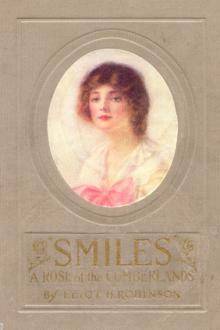'Smiles' - Eliot H. Robinson (uplifting books for women .txt) 📗

- Author: Eliot H. Robinson
- Performer: -
Book online «'Smiles' - Eliot H. Robinson (uplifting books for women .txt) 📗». Author Eliot H. Robinson
Donald placed his elbows on his knees and buried his face in his hands with a stifled sound, which might have been groan or curse, and very gently Smiles' hand stole up in the darkness and stroked his tumbled hair, until the man's own fumblingly sought and held it close, to find mute comfort in her warm clasp.
"Perhaps I understand better than you think the reasons which underlie these most unhappy events," answered the old man slowly. There was no rebuke in his quiet voice.
"Although it is true, doctor, that the deeper we get into the heart of primal nature, the closer we get to the heart of nature's God, it is equally true that the nearer we also get to the primal in man.
"I cannot help feeling that the city's laws and conventions trammel the spirit in its free exercise of self, which is ill; but yet the inbred realization of those very laws and conventions, and the fear of consequences if they are broken, act as a salutary check on the primitive passions inherited by every one of us from our savage ancestors.
"Of course, I know that, in places where men are crowded together, such man-made laws and conventions are wise and necessary; but the life which results is not—cannot be—full and natural as it may be in an isolated place like this, when honest obedience is paid to the still higher laws of God—and it is for that obedience which all of us must strive constantly.
"You failed in the test to-day; but, believe me, there are many in these mountains who, lacking all the advantages of training and education which are yours, meet it. Their lives are lived under nature's higher laws in perfect sincerity, and, although they might not conform to the standards of so-called civilization, they are surely purer in God's sight than those of millions who pattern theirs by printed precept."
"I reckon," murmured Smiles, "that St. Peter had to put many black marks on three books to-day ... yes, mine too, for I was wickedly angry. It was hate that made me run away from Doctor Mac, and if I hadn't done it, M ... M ... Mike wouldn't have been shot." She leaned her head against Donald's arm, and cried softly.
"'The wages of sin is death,'" said the minister. "And he paid the penalty for you, Dr. MacDonald, sacrificing himself because of his great love. Poor little Mike. Such faithful animals as he must have souls, and his is now in its own paradise."
No one spoke for a little, and then Mr. Talmadge continued to muse aloud.
"Mere repentance, such as the doctor now feels, is not enough. You remember the parable of the woman who drove the evil spirit from her fleshly temple, and swept it clean, but failed to fill its place with another guest, and seven other devils came and repossessed it? So it is always with human life, Dr. MacDonald. Nature abhors a vacuum, and so does the spirit. If a man does not fill his soul—swept free of past evil by repentance—with that which is actively good, the repentance is of little avail."
"Yes, yes, I can readily understand that, for it has a parallel in bodily illness," answered Donald, somewhat impatiently. "We all know that, when the sick physical being is freed of its disease, it is left weak and an easy prey for new troubles. We can bring back to it the strength to resist by giving nerve-and tissue-building food and tonics, but how is the spirit to be ..."
"How persistently the earth-man kicks against the pricks," cried Mr. Talmadge. "Child, your friend will not lift his eyes from the maze of doubt. You pledged yourself to help him. Help him now."
Her face suddenly glowing with light, Rose turned to Donald eagerly, and said without hesitation, "Oh, Doctor Mac, don't you see? The answer is so clear, so simple that even I know it. The dear God spirit is everywhere, just waiting for you to call it to your aid. Please pray to Him to give you new strength so that you may not be weak again, and I will pray, too."
"Yes," supplemented the minister, "'Whence cometh my help? My help cometh even from the Lord, which hath made heaven and earth.'"
Donald was strongly moved at the eager interest in him which these two displayed. Shifting uncomfortably he replied, "I need His help, I know; but ... but I guess I have forgotten how to pray for it."
"Open your heart with sincerity, and He will enter and bestow the strength you need in order to take up your task anew, and carry on until your purpose here on earth has been accomplished. That is all that prayer need be, for He is ever more ready to give than we to receive. Verbal petitions are vain and empty things; honest communion with Him is prayer."
He arose, content to say no more, and to leave the sorely troubled spirit of the stranger to Smiles' tender ministrations. "I am deeply sorry for you in your distress, Dr. MacDonald, but although there is small comfort in the remark, I cannot help but feel that what has happened was ordained to complete your lesson, so that you may leave these hills with a new understanding and higher purpose in life. Good night, and God be with you all."
"Doctor Mac," began Smiles timidly, at length. "I'm sorry for what I said to you this afternoon, and I want to take it back. I guess when you're angry you don't see things as they are, and I'm sure that you were only being very, very kind to me when you ... you bought those baskets. I love you for it, really I do, and if ... if you want me to keep the money, and it would hurt your feelings if I...."
"Of course I want you to keep it, dear. Yesterday you took me for a foster-brother, and I hope that you will always let me do for you as I would for a real flesh-and-blood sister."
"I promise, and I will always do the same for you if I can, dear Don," she whispered softly, adding, "but somehow to-night—oh please don't laugh at me now—somehow to-night I feel more like ... like a mother, than a sister to you."
"And I truly think you are—a spiritual mother, little woman. I need you much more than you need me, I guess."
"Do you know," he went on, after a moment, "I am beginning to believe that I was wrong this afternoon when I said that ... that Judd lied about adding to the money he received for your baskets. Of course I have no way of making sure, unless you have kept accounts, but I actually begin to think that he did."
"I know it," she replied promptly; but with a troubled voice. "Judd has been very wicked, but he doesn't lie. I think that he meant it the way ... the way you did, too; but he's different and I mean to give it all back to him." There was another pause, and then Smiles said gently, "Donald, it makes my heart ache like, to tell you this, but I've got to now. I want that you should go away early to-morrow morning."
"What?" he burst out angrily, springing to his feet. "And have him believe that I ran away from him again? No, how can you ask it, Rose?"
"It isn't that. We know, and he knows now, that you're not afraid of him. But this mountain is his home, and, if you stay here, there is sure to be more trouble, and I couldn't bear that, Don. Even if one of you wasn't ... wasn't hurt in the body, wicked thoughts would hurt your souls. I know it is so, and you must go ... but, oh, how I am going to miss you."
For a moment Donald stood tense; then his body relaxed weakly and he answered, "Yes, you are right, Smiles. It is up to me to go; but I know that some day these clouds are going to be lifted somehow, and we shall see each other again and be happy together."
"I know it, too," she answered, with a sob catching her breath. As she spoke, the clouds, which had been covering the moon for some time, broke, letting the cool, white light flood the mountain side like a promise, and her face lit up with the old wondrous smile. "Of course we will," she cried. "Why, I mean to be your own special nurse some day, and help you always. Good-night, dear Don."
She turned and ran quickly into the cabin, so that he should not see the tears which followed the smile.
"Rose war right erbout yo'r goin',—I reckon she air allus right," came Big Jerry's voice. "Yo' hev got ter go; but I'm ergoin' ter miss ye powerful, likewise, lad."
"But I'll see you again, too, before long. I've got some of my sense back, and I mean to write Judd that I am engaged to a girl in the city—not that I want his friendship after what has happened, however—and I will be down here again, for a few days at least, when the atmosphere has cleared—perhaps early this winter."
"Taint likely yo'll ever see me ergin on earth, son," Jerry said heavily. "Reckon I'm most done fer."
"Your heart? Is it very bad?" queried Donald.
"I allows hit's nigh ter bustin'," was the steady response. "But mebbe I'll last some while yet—I hopes so, fer leetle Smiles' sake. I haint blind ter what hes happened, an' I knows thet the time air comin' when she's es plumb sartain ter fly erway from this hyar mountain es a homein' dove; fer she hes heard the call uv her city blood, an' hit haint ter be denied. But I reckon she haint ready ter leave the old nest yet, so I aims ter stay on erwhile longer ... fer her, though hit haint goin' ter be in no wise easy fer ter do."
The younger man knew not what answer to make to this affecting declaration; but the necessity of a reply was forestalled, for Big Jerry stepped closer and continued earnestly, "Since yo' wished fer ter be a son ter me, I air ergoin' ter treat ye es sich, an' tell ye something thet I've done fer the leetle gal, an' thet she don't yet know erbout.
"Back in the spring when I seen thet her mind war made up ter be a nurse, an' I knowed thet my own time war comin', I sold the timber rights ter these hyar woods ter a city lumber company fer a thousand dollars. They haint ergoin' ter cut fer some years yet, an' by thet time I won't be hyar ter grieve, an' Smiles won't neither.
"Thet money, an' a leetle more what I hev saved, air ter be hern ... hit's in er savin' bank down ter the city now. But thet haint all I wants ye ter know. The reverend drawed a last will an' testiment fer me, leavin' this hyar land ter her—she haint blood kin of mine, yo' know, nor adopted by law-an' I reckons hit will be val'able some day, fer a city stranger told me oncet thet thar's coal on hit. So





Comments (0)